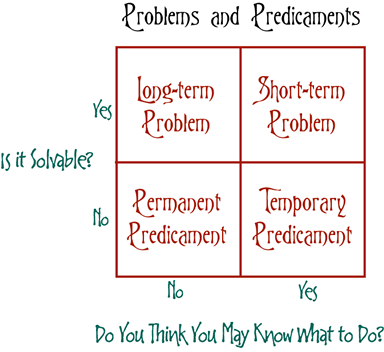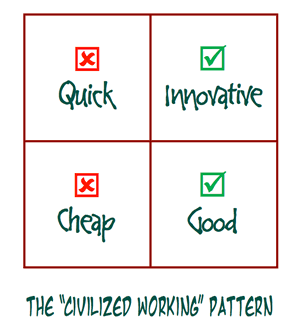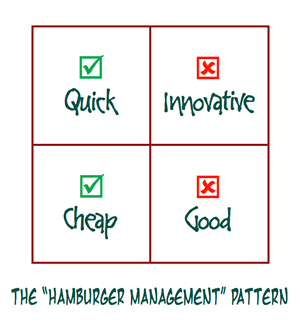Many people claim that competition is natural: that animals compete for mates and food, and that dominance is part of the social pattern in creatures as diverse as birds, wolves, and chimpanzees. This usually referred to as
Social Darwinism: the belief that inequalities in human societies are both entirely natural and justified by the meritocratic principle. In the past, people have used perverted forms of Social Darwinism (which has nothing whatsoever to do with Charles Darwin and his theory of evolution) to justify eugenics, racialism, slavery, oppression, and ethnic cleansing. Today, in Western (and especially American) society, we are brought up to believe that competition is a good way to motivate people, that it guarantees an optimal distribution of resources, and that it buildscharacter.
Is this correct? Maybe the best way to decide is to see whether it works.
A child who experiences the pain of being a loser may try harder as result; that is the theory. However, what happens at least as often, and maybe more so, is that the child resolves to avoid such pain in future by accepting the “loser” position voluntarily.
Does being labeled either a winner or a loser motivate people? It seems that it should, so long as people like being winners and dislike being called losers. However, that ignores a powerful factor in human behavior: fear. A child who experiences the pain of being a loser
may try harder as result; that is the theory. However, what happens at least as often, and maybe more so, is that the child resolves to avoid such pain in future by accepting the “loser” position
voluntarily. The reasoning is that it is less painful to label yourself a loser, and stay out of the competition as a result, than it is to compete and lose.
Now we have the opposite of what we wanted: a group of people who are thoroughly
demotivated by competition, to the extent that they no longer even try. If this becomes institutionalized in whole segments of society, so that large numbers of people never attempt to compete, because they believe they have no chance of winning and every chance of being humiliated, you have produced alienation and a rejection of society’s (competitive)norms—which is what seems to cause riots by racial minorities in France, the miserable educational progress of many children from poor areas in the United States, and the flow of people willing to commit suicide for terrorist masters in the Middle East. People remember how wretched they felt when they lost, so they find other means of avoiding the pain than trying to win next time—in large part because they have lost the confidence that they ever can win.
It is even worse when those forced to compete have no confidence in the basis of the judgment of who has won or lost.
It is even worse when those forced to compete have no confidence in the basis of the judgment of who has won or lost. If you think that the judges are biased, maybe by favoritism, by racial or gender bias, or by basing their decision on possession of the “right background” or the “right parents,” why should you compete? What if you suspect that the decisions are made on a totally subjective basis, with each judge having a different idea about what is needed to be declared the winner? That is the truth of the situation in many organizations today. Not only are people anxious about being forced to compete at all, they strongly suspect the judges may be biased or the precise criteria for success more or less random.
“Up or out” is a philosophy that can be found in many businesses. You either make it up the corporate ladder (with the competition becoming more severe with every step), or you are ejected or must leave because of your failure to advance.
The more extreme the competition, the more likely that this negative result will be produced. Many of today’s business are fiercely competitive. Not only is winning seen as everything (sometimes justifying extreme, even criminal, behavior), but losing is the ultimate disgrace. What results is not just loss of face, it is extinction. “Up or out” is a philosophy that can be found in many businesses. You either make it up the corporate ladder (with the competition becoming more severe with every step), or you are ejected or must leave because of your failure to advance.
If the effect on the losers can be terribly harmful, what about the winners? Surely that are, literally, “up the ladder,” rejoicing in their success and powerfully motivated to do ever better?
Many “high fliers” are continually wracked with anxiety at the mere thought of failure—though they have probably never yet failed in their lives.
Not so. If success is so sweet, failure become a hideous nightmare. Many “high fliers” are continually wracked with anxiety at the mere thought of failure—though they have probably never yet failed in their lives. As a result, they are amongst the most superstitious and anxious people there are. Whether it is the star sports personality who must always put on his left sock before the right one when dressing for a game (because he first won after doing that); or the pop star who must be more bitchy, more outrageous, or throw bigger tantrums than everyone else (because that produces the constant reassurance of publicity, however negative); or the CEO who cannot tolerate subordinates who might threaten her position of corporate stardom (and smells treachery everywhere), the basis of their crippling fear is the same: the mere notion of failure.
You cannot even argue that such a situation might be bad news for the individual, but it will produce exceptional striving and success for the organization (Though that would be a level of cynicism and disregard for individual welfare that might be seen as remarkable even today). “Star” CEOs, blinded by fear of failure and anxiety that every subordinate is plotting to take their position, are often driven to take crazy risks, betting the future of the organization as a whole on the chance that they can, once again, experience the ecstasy of winning and fend off the black terror of seeing someone else do so.
Why do we persist in believing that the best way to organize people . . . is by using competition to produce distinctions between them—as if Nature had not made people distinctive enough already?
Businesses are communities. They exist to do what no individual can do alone. Why do we persist in believing that the best way to organize people within these communities is by using competition to produce distinctions between them—as if Nature had not made people distinctive enough already?
Take monstrosities like “performance management.” Why should anyone believe that regularly and rigorously sorting people into “sheep” and “goats” will be a positive experience for anyone involved? Most managers hate doing it; most employees hate it being done to them. It is the organizational equivalent of taking a length of two-by-four and whacking people across the head to encourage them to do what they would do anyway, if they were treated like rational human beings. As Tony DiRomualdo wrote recently in an article called
The Myth of Performance-based Management:
In the performance-based organization, tough-minded managers push everyone to their limits (and beyond) in pursuit of extraordinary levels of performance. Performance management systems are used to track and evaluate everyone in the organization to make sure they are performing to the standards set for them. Those who don’t produce are punished or terminated. . . . Proponents of performance-based management assume that [the] objectives are derived from objective data and judgments. Cynics suspect they are based on the performance goals the CEO needs to make his or her bonus. . . . but the fact that so many of these management approaches fail to produce the results expected suggests there may be other, more productive and less stressful ways to keep an organization on the right performance track.
Competition is not any kind of panacea. It has as many bad aspects as (theoretically) good ones. Creating a meritocracy sounds like a rational and logical way to decide on matters of reward, advancement, or selection for high office, but that depends on what is seen as the basis of “merit.” Using competition as the mechanism for sorting out the deserving few from the undeserving many is simply elitism hidden behind a more acceptable facade. Merit has nothing to do with competition in itself. It is all about value, which is something every human being (and every creature) possesses.
In a civilized organization, value should be openly discussed, openly weighed, and convey no suggestion that those who did not fit one particular set of needs are in any way diminished as a result. There will always be a need to choose between people in business and organizational settings, but nothing says that it must be done by using the extremely blunt and dangerous instrument of poorly-judged competition.

















